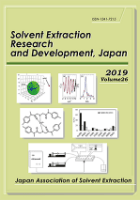
SOLVENT EXTRACTION RESEARCH AND DEVELOPMENT-JAPAN
Scope & Guideline
Unlocking the potential of solvent extraction for all.
Introduction
Aims and Scopes
- Solvent Extraction Techniques:
The journal emphasizes the development and refinement of various solvent extraction techniques, including liquid-liquid extraction, solid-phase extraction, and the use of novel solvents such as ionic liquids and deep eutectic solvents. - Separation of Metal Ions:
A core area of research involves the extraction and separation of metal ions from various matrices, including waste streams, brines, and acidic solutions, focusing on metals such as lithium, rare earth elements, and transition metals. - Environmental and Economic Applications:
The journal highlights studies that contribute to environmental sustainability and economic efficiency, including the recovery of valuable resources from waste, the use of green solvents, and the reduction of hazardous materials in extraction processes. - Kinetic and Thermodynamic Studies:
Research often includes detailed kinetic and thermodynamic analyses of extraction processes to understand the mechanisms involved and optimize conditions for maximum extraction efficiency. - Innovative Extraction Methods:
The journal features advancements in extraction methodologies, such as ultrasound-assisted extraction, microwave-assisted extraction, and the use of supported ionic liquid membranes, showcasing innovative approaches to enhance extraction performance.
Trending and Emerging
- Lithium Extraction:
With the rising demand for lithium in battery technologies, research on lithium extraction from various sources, including brines and magnesium-rich solutions, has become increasingly prominent, indicating a shift towards addressing the needs of the energy sector. - Ionic Liquids and Green Solvents:
There is a growing trend towards the use of ionic liquids and other novel green solvents for extraction processes, driven by the need for more sustainable and less toxic alternatives in the field. - Recovery of Rare Earth Elements:
The extraction and recovery of rare earth elements are gaining traction, particularly in the context of resource scarcity and the need for sustainable practices in high-tech industries. - Biological and Plant-based Extraction:
Emerging studies focus on the use of biological methods and plant cell cultures for the extraction of valuable compounds, such as paclitaxel, highlighting a trend towards more environmentally sustainable and bio-based extraction processes. - Use of Machine Learning in Extraction Processes:
The integration of machine learning techniques for predicting extraction efficiencies and optimizing extraction conditions is an emerging theme, showcasing the intersection of computational techniques with experimental solvent extraction research.
Declining or Waning
- Traditional Solvent Systems:
Research on conventional solvent systems, such as organic solvent mixtures, has seen a decline as researchers increasingly explore greener alternatives, such as ionic liquids and deep eutectic solvents, which are perceived as more environmentally friendly. - Basic Extraction Mechanisms:
There appears to be a waning interest in purely theoretical studies focusing on basic extraction mechanisms without practical applications, as the field moves towards studies that emphasize practical, real-world applications and implications. - Extraction of Common Metals:
The frequency of studies dedicated to the extraction of common metals like copper and aluminum from standard sources has decreased, possibly due to saturation in this area and a shift towards more complex or valuable metal recovery processes.
Similar Journals
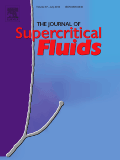
JOURNAL OF SUPERCRITICAL FLUIDS
Illuminating the Future of Supercritical Fluid StudiesThe JOURNAL OF SUPERCRITICAL FLUIDS, publishing since 1988 and represented by Elsevier, stands as a pivotal platform for research in the dynamic fields of chemical engineering, condensed matter physics, and physical and theoretical chemistry. Located in the Netherlands, this esteemed journal focuses on the development and application of supercritical fluid technology, exploring its implications across diverse scientific disciplines. With impressive rankings, including Q2 in multiple categories, the journal reflects a strong commitment to advancing knowledge and innovation, thereby establishing its significant impact in the scientific community. Though not an open-access publication, it provides options for authors to ensure the visibility and reach of their work, appealing to researchers, professionals, and students alike. The JOURNAL OF SUPERCRITICAL FLUIDS continues to be a crucial resource for those dedicated to enhancing the understanding of supercritical fluid phenomena, fostering collaboration and inspiration among academics and practitioners worldwide.
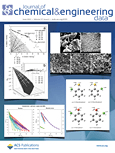
JOURNAL OF CHEMICAL AND ENGINEERING DATA
Exploring the Intersection of Chemistry and Engineering ExcellenceThe Journal of Chemical and Engineering Data (ISSN: 0021-9568, E-ISSN: 1520-5134) is a prestigious publication by the American Chemical Society, dedicated to disseminating high-quality research within the fields of chemical engineering and chemistry. With its history dating back to 1956, the journal has evolved to encompass a wide array of topics essential to the advancement of both disciplines, reaching an impressive convergence year of 2024. Positioned in the Q2 quartile for both Chemical Engineering and Chemistry, it boasts a commendable ranking of 95th out of 273 in General Chemical Engineering and 146th out of 408 in General Chemistry, reinforcing its significance within the academic community. As a vital resource for researchers, professionals, and students alike, the journal encourages rigorous submissions that contribute to the understanding and application of chemical and engineering data, despite its traditional access model. By bridging theoretical insights with practical applications, the Journal of Chemical and Engineering Data remains an indispensable tool for those seeking to drive innovation and efficiency in the chemical sciences.
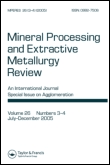
Mineral Processing and Extractive Metallurgy Review
Innovative Insights into Mineral Processing and MetallurgyMineral Processing and Extractive Metallurgy Review, published by Taylor & Francis Inc, is a leading academic journal dedicated to advancing the field of mineral processing and extractive metallurgy. With a strong focus on innovative research and methodological advancements, this journal serves as a critical resource for researchers, professionals, and students alike, offering insights into the latest developments in the extraction and processing of minerals. Currently holding a prestigious Q1 ranking across multiple categories, including Chemistry (Miscellaneous), Economic Geology, and Mechanical Engineering, it demonstrates a significant impact in the scientific community, evidenced by its ranking in the 93rd percentile in Mechanical Engineering and Geotechnical Engineering. This journal is pivotal for anyone involved in the study and application of mineral resources, making it an essential read for those looking to deepen their understanding of the relationship between mineralogy and technology-driven solutions in modern engineering. In addition to its traditional subscription-based model, the journal aims to promote wider accessibility to such crucial knowledge within the industry.

Machine Learning and Knowledge Extraction
Connecting Minds to Foster Knowledge in Machine LearningMachine Learning and Knowledge Extraction, published by MDPI, is an esteemed Open Access journal that has been at the forefront of disseminating cutting-edge research since its inception in 2019. Based in Switzerland, this journal has established itself as a significant contributor to the fields of Artificial Intelligence and Engineering, currently ranking in the Q2 category in Artificial Intelligence and Q1 in Engineering (miscellaneous) for 2023. With a notable Scopus ranking, it holds the 35th position out of 204 in Engineering, placing it in the 83rd percentile, while it ranks 127th out of 350 in Computer Science, reaching the 63rd percentile. Machine Learning and Knowledge Extraction serves as a vital platform for researchers, professionals, and students alike, promoting insightful discussions, innovative methodologies, and profound discoveries in machine learning and data extraction techniques. The journal's open access model ensures that groundbreaking research is widely accessible, fostering collaboration and advancing knowledge across various disciplines.
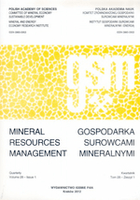
Gospodarka Surowcami Mineralnymi-Mineral Resources Management
Navigating the Dynamics of Resource ExploitationGospodarka Surowcami Mineralnymi-Mineral Resources Management is a pivotal academic journal published by the Polish Academy of Sciences and the Mineral and Energy Economics Research Institute. Focusing on the field of Economic Geology, this journal plays a critical role in disseminating research on mineral resources management, exploring the economic implications of mineral exploitation, sustainability practices, and technological advancements in resource extraction. With an ISSN of 0860-0953 and an E-ISSN of 2299-2324, the journal has established itself as a respected source of knowledge, holding a Q3 ranking in its category as of 2023 and demonstrating its relevance within a competitive landscape where it ranks 22nd out of 43 in Economic Geology according to Scopus. Researchers, professionals, and students will find this journal to be an invaluable resource for the latest insights and developments in mineral resource management, contributing significantly to the overarching conversations in geology and environmental science.

Separations
Elevating Knowledge in Filtration and Separation ProcessesSeparations is a prestigious open-access journal published by MDPI, dedicated to advancing the fields of analytical chemistry and filtration and separation processes. Established in 2014, the journal has swiftly emerged as a significant platform for disseminating groundbreaking research and innovative methodologies in separation science, boasting an impressive E-ISSN of 2297-8739 and operating out of Basel, Switzerland. With its focus rotating from 2016 through 2024, Separations has been categorized in the Q3 quartile for both analytical chemistry and filtration and separation disciplines as of 2023, demonstrating its relevance in these scientific areas. The journal's rankings in Scopus, with 93rd out of 156 in analytical chemistry and 15th out of 19 in chemical engineering filtration and separation, reflect its commitment to high-quality research accessible to a global audience. Researchers, professionals, and students will find valuable insights and pioneering findings that foster collaboration and innovation within the vibrant community of separation science.

THEORETICAL FOUNDATIONS OF CHEMICAL ENGINEERING
Charting New Territories in Chemical Engineering ResearchTHEORETICAL FOUNDATIONS OF CHEMICAL ENGINEERING is an esteemed academic journal published by PLEIADES PUBLISHING INC, dedicated to advancing the field of chemical engineering and chemistry through rigorous theoretical discourse and scholarly communication. With a history of publication dating back to 1974, the journal has been a vital resource for researchers and professionals, contributing to the foundation of knowledge in this multidisciplinary domain. Although it does not offer open-access options, it remains an essential platform for innovative research, boasting a 2023 ranking in the Q3 quartile for both Chemical Engineering and General Chemistry categories. The journal is indexed in Scopus, where it ranks #210 out of 273 in Chemical Engineering and #317 out of 408 in Chemistry, emphasizing its growing relevance within the scholarly community. Researchers, educators, and students alike can benefit from the insights and findings shared within its pages, making it a critical venue for those seeking to enhance their expertise in theoretical chemical engineering.

China Petroleum Processing & Petrochemical Technology
Unveiling critical advancements in chemical engineering.China Petroleum Processing & Petrochemical Technology is a critical journal published by the China Petroleum Processing & Petrochemical Technology Press, focusing on the pivotal advancements within the field of petroleum processing and petrochemical technology. With ISSN 1008-6234, the journal has been a significant resource since its inception in 1999 and aims to disseminate original research articles, reviews, and case studies that contribute to knowledge and innovation in energy engineering, fuel technology, and chemical engineering. Despite its current Q4 status in various quartile rankings, it provides essential insights and research that are invaluable for researchers, professionals, and students interested in these expanding areas. The journal is located in Beijing, China, and continues to strive for excellence in academia, encouraging contributions that address pressing challenges in the petroleum and petrochemical industries while fostering a deeper understanding of process chemistry and technology.

JOURNAL OF SOLUTION CHEMISTRY
Innovating Research in Biochemistry and BeyondJournal of Solution Chemistry, published by Springer/Plenum Publishers, offers a vital platform for researchers and professionals engaged in the complex interplay of substances in solution, focusing on the interdisciplinary aspects of Biochemistry, Biophysics, Molecular Biology, and Physical and Theoretical Chemistry. Established in 1972 and traversing to 2024, this journal features extensive research articles that contribute significantly to the understanding of solution chemistry phenomena. Although it is categorized as Q4 in Biochemistry and Molecular Biology and Q3 in Biophysics and Physical and Theoretical Chemistry, the journal is set apart by its commitment to fostering innovative studies and methodologies within these domains. With an ISSN of 0095-9782 and an e-ISSN of 1572-8927, it remains accessible to a wide range of scholarly audiences despite the absence of open access options. As an essential resource for anyone invested in the foundational aspects of chemical interactions, the Journal of Solution Chemistry continues to shape the discourse in solution-based research, making it a critical asset for ongoing academic pursuits.

HYDROMETALLURGY
Transforming research into practical metallurgical applications.HYDROMETALLURGY is a premier journal dedicated to advancing the field of hydrometallurgical processes, published by Elsevier. Since its inception in 1975, it has become a vital resource for researchers and practitioners in the realms of industrial and manufacturing engineering, materials chemistry, and metallurgical science. With its impressive impact factor and ranking in the top quartiles of its categories, this journal consistently disseminates high-quality research and reviews that drive innovation in materials extraction and processing. The journal is essential for those involved in the development of sustainable metallurgical practices, sharing insights on cutting-edge techniques and applications in metal recovery and recycling. Although not an open access publication, HYDROMETALLURGY offers valuable access options, facilitating in-depth study and exploration of current advancements in the field. As it continues to bridge theoretical knowledge and practical application, researchers, professionals, and students alike are encouraged to contribute their findings and engage with the community.